#d’angelo barksdale
Text
All the pieces matter.
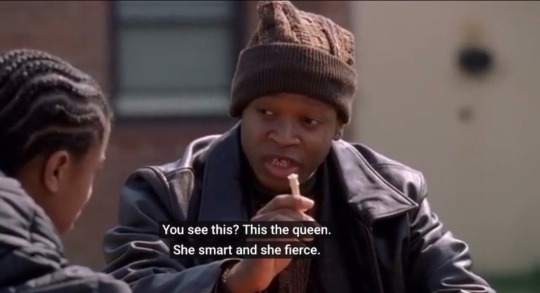
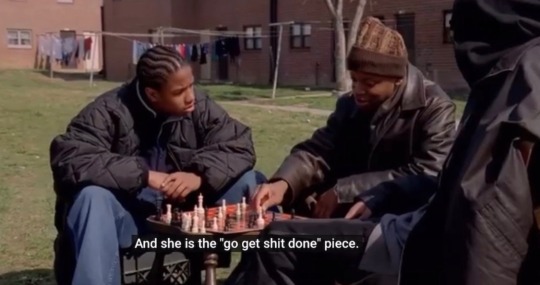
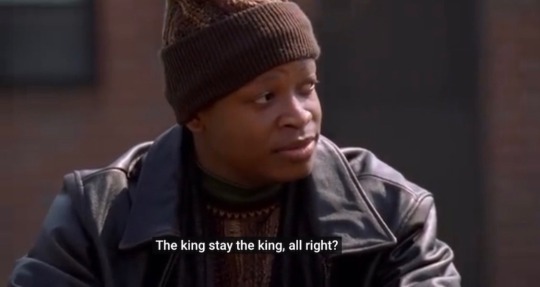
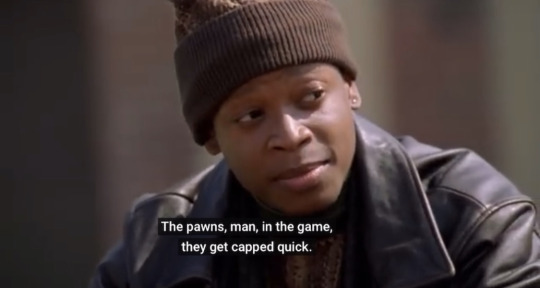
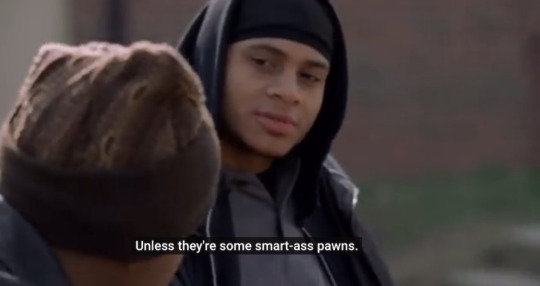
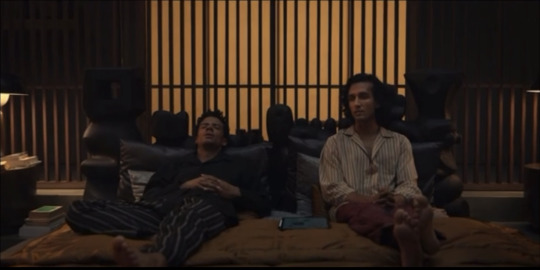
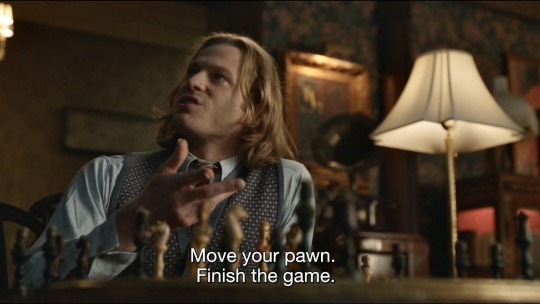
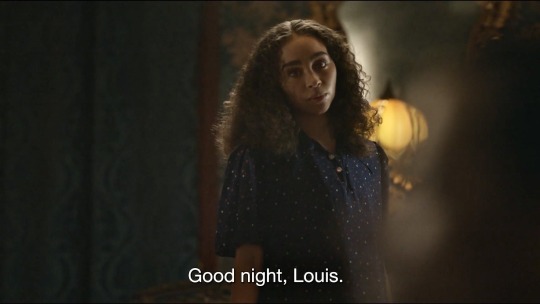
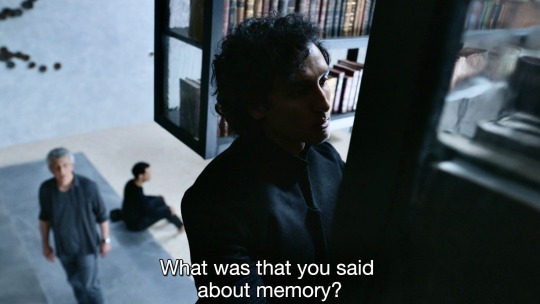
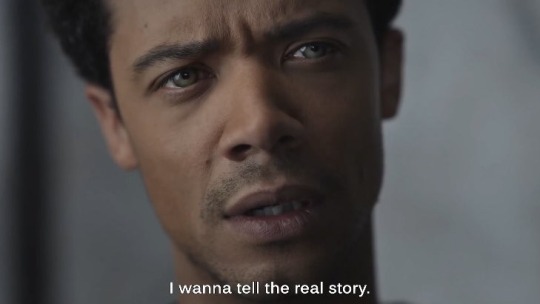
#yn.#the wire#iwtv#iwtv s2#bodie broadus#d’angelo barksdale#armand#lestat de lioncourt#claudia#louis de pointe du lac
48 notes
·
View notes
Text
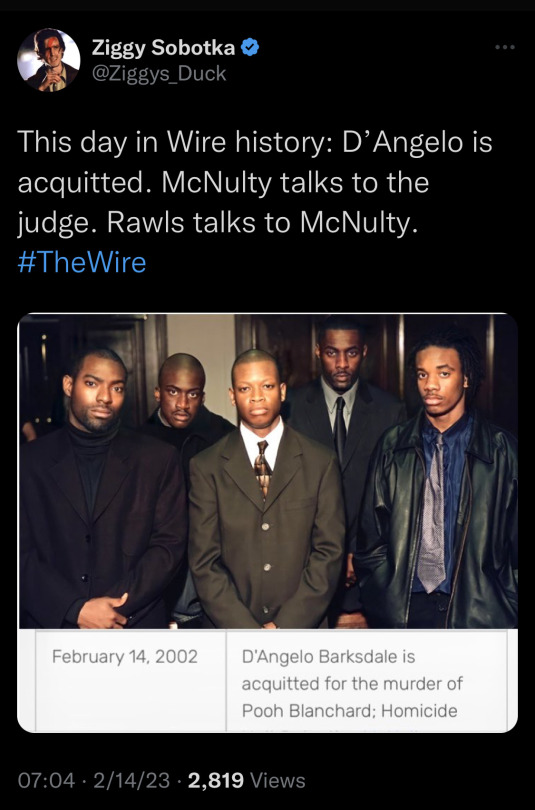
#The Wire#The Wire Season 1 Episode 1#D’Angelo Barksdale#The Barksdale Organization#The Wire Season 1
70 notes
·
View notes
Text
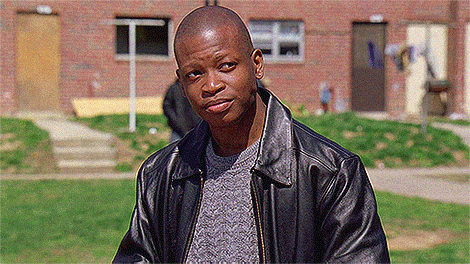
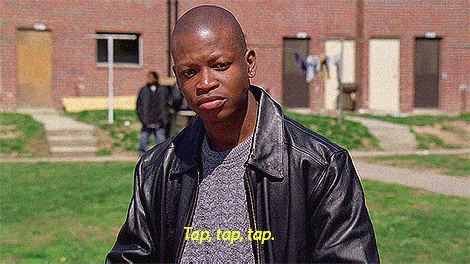
3 notes
·
View notes
Text
I am doing my obligatory yearly rewatch of The Wire early, this year. And one thing I always really love about this show is the way it asks and answers its own questions over the 5 seasons.
In Season 1 we have D’Angelo Barksdale’s main arc. He reaches a turning point towards the end of those 13 episodes, with the decision to co-operate with law enforcement and live a different life in witness protection. This turning point is familiar to viewers as The Right Thing To Do, from countless other movies and shows on law enforcement.
But D never does get to follow through with his police co-operation, because his family get to him last minute. His mother turns him by stoking a deep fear of loss and the unknown in him. What would his life even be, without his family? His people? And so, D’s run on the show finishes with his own syndicate killing him, while he is in prison.
His arc is mirrored in Wallace’s that first season. In Wallace, we see that same fear of loss of self/home that comes with being a protected police witness, and the return to the familiar that leads to his death.
The viewer might observe this and think, ok, neither D’Angelo nor Wallace got to follow through on witness protection/police co-operation. Maybe this was a missed opportunity for them? Did they miss out on the chance to survive and lead a better life?
But in Season 2 the show gives us this answer in Frank Sobotka. By the end of his Season 2 arc, Frank is determined to tell the police and FBI every detail he knows of the criminal enterprise he was working for. But institutional failures in the FBI, due to corruption and information leaks, get him killed before he is able to tell the police anything at all.
Ok, then, the viewer might think. But what if there were no leaks, what then? And the show immediately gives us his nephew, Nick, who does co-operate with the state and live. But he experiences the thing that D’Angelo’s mother used to turn him in Season 1. He loses his connection to home and his self-identity. And it is a hollow kind of survival.
Right, the viewer might think next. So law enforcement obviously can’t be trusted. Maybe the real trick for these characters was that they should have kept their mouths shut. Stayed a good soldier, and remained loyal to the criminal syndicates they were part of?
The show is way ahead of you there. In Season 3, we are given the example of Cutty. One of the loyal soldiers who worked for the Barksdales back in the day. He did his time in prison, fourteen years of it, and never wavered from his loyalty to them. Then he is released from prison and finds himself utterly out of time, and lost to himself. He tries to go back to his life before prison, but that doesn’t fit him. He ends up moving on from ‘the game’. And all he has to show for his loyalty is time served, and trauma, as he works to find something to build a new life with.
Ok ok, the viewer might say. So maybe, if there is no escape from ‘the game’ once characters have gotten involved with it, the answer lies in the children. What about education? Surely intervening early will give these characters a chance? They can graduate, go to university, and do ‘anything [they] want’, like the fixer says of his own children, to Frank Sobatka in Season 2.
Season 4 pulls no punches on this one. It follows a group of children starting their school year at a Baltimore middle school. It shows us how they are set up for failure, due to poverty and an absence of any real social safety-net, the lack of support in their home lives, the financial draw of the drug trade or other systemic failures.
This kind of escalation, this ask and answering as the plot of the show develops season to season, is just as nihilistic in its depictions of the characters working the Law Enforcement/Political side of things.
In Season 1 we immediately see that the homicide detectives in the Baltimore Police Department only care about clearances, they don’t care deeply for each case, not the way you’re used to being spoon-fed in copaganda shows and films. They would rather a murder not get solved, then be the one stuck with the bad stats.
The viewer might find themselves hungry for the Cop That Cares, and is immediately rewarded because Jimmy McNulty is given to them from the very start. He’s going to fix things, surely. Because this is the narrative progression we have come to accept. One good cop doing right, that’s what will make the difference.
The show wastes no time in showing that he is a selfish fuckup in his personal life. But again, this is a trope we are used to. it’s fine. He will still fix things, he is crusading to go after the Bad Guys after all, when no one else is listening or caring.
The show exists to disabuse us of this notion. And if his arc is Season 1 isn’t enough, it hammers it home season after season, as every level of law enforcement, the legal system (basically every government entity including the media) is shown to be broken in countless ways. Broken due to selfish incompetence, or by design.
And so, what starts in Season 1, as a wish for the police to take Avon Barksdale down, turns into something else looking back. You begin to see how pointless all that work was, how futile. How performative. The show will not let you get away with any form of hope that things might get better, for even the people who push for change, or fight for justice in a broad sense, will fail to follow through as the system they’re working within grinds them down.
Not a cheerful show, on the whole. But at least it feels true. (Though admittedly, Season 5 really beats you over the head with it).
#I did a read more because no one wants to read my nonsense#this happens everytime I watch this show#it is just so intricate#I love it so much#The Wire
16 notes
·
View notes
Text
Guess My Type
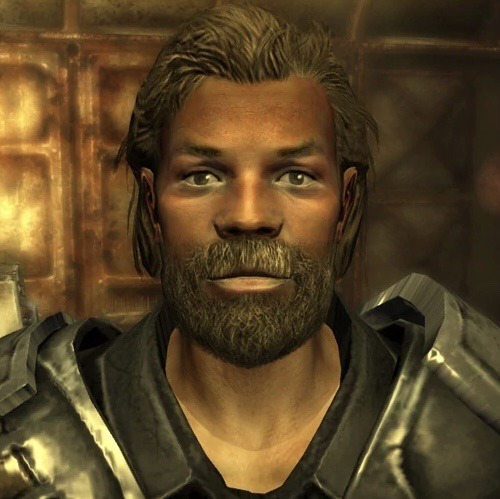
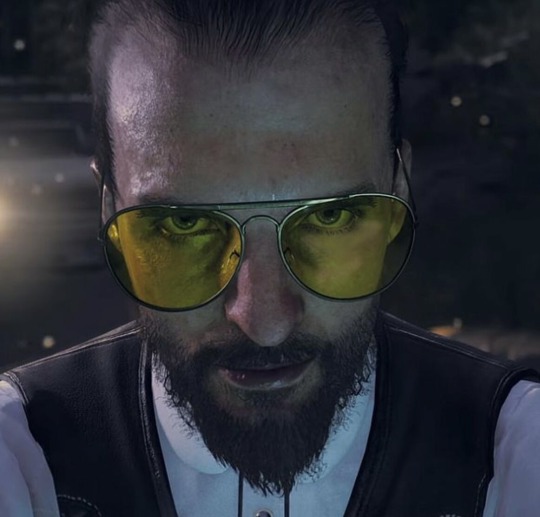
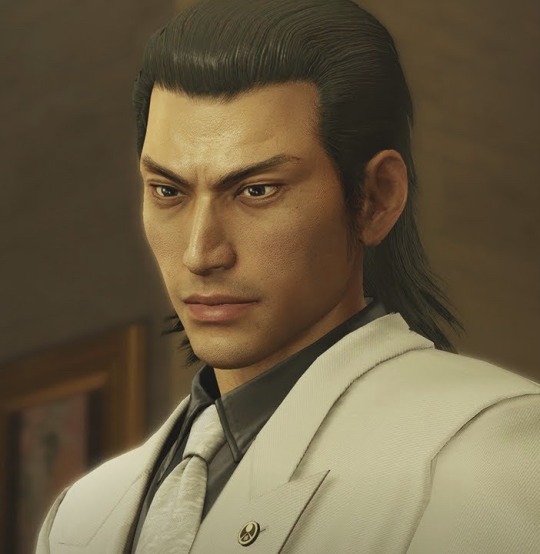
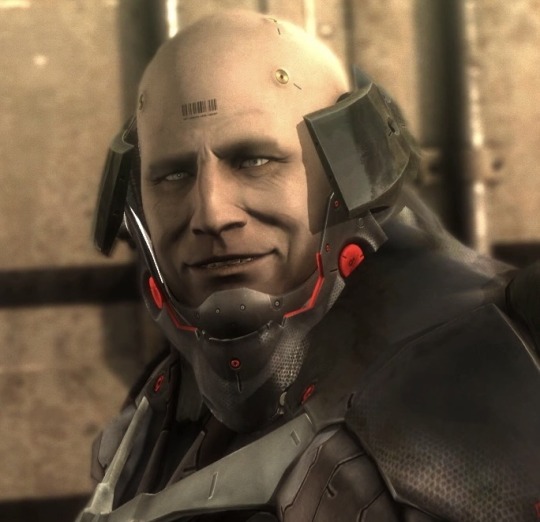

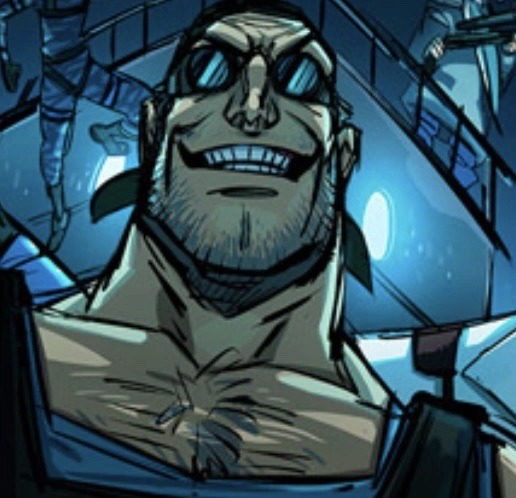
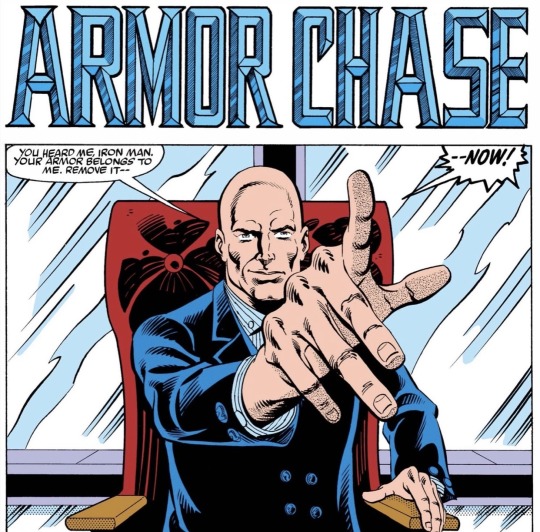
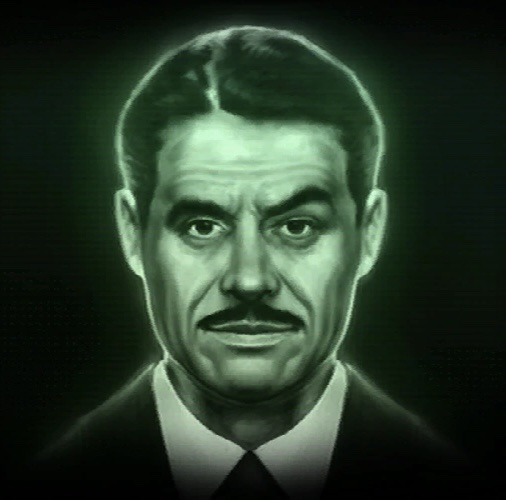
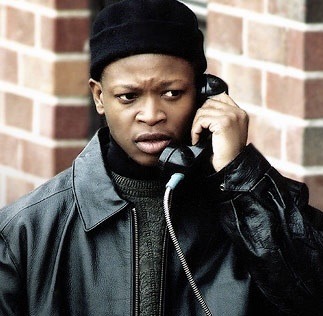
Sam Cooke (Fallout: New Vegas), Joseph Seed (Fishing Simulator), Akira Nishikiyama (Yakuza), Fucking Invincible (Metal Gear Rising), Tracey Lader (Fishing Simulator), The Classic Heavy (Team Fortress), Obadiah Stane (seen here purchasing a strip tease, Iron Man Comics), Robot Fetishist Walt Disney (Fallout: New Vegas), and D’Angelo Barksdale (Deserved Better)
Tagged by the lovely @derelictheretic and @henbased
Tagging: @adelaidedrubman @vasiktomis @smithandrogers @strafethesesinners @shallow-gravy @florbelles
#ah yes the three genders#cult leader#rude as fuck#and Capitalism#(this is a joke. Sam Cooke is not a cult leader. watch When They See Us.)#joseph seed#sam cooke#akira nishikiyama#sundowner mgr#tracey lader#tfc heavy#obadiah stane#robert house#dangelo barksdale#powder gangers
27 notes
·
View notes
Text
I would never say that Marlo’s gang are “better” than the Barksdale organization, but I’ve finally put my finger on why they improve the show so much: they’re laconic. Lol. The drama of the Barksdales—D’Angelo in s1 and Stringer/Avon’s relationship and falling out—is great character writing. But the early seasons are so dialogue heavy. It’s not that the dialogue is bad, or even overly relied on; the show always knew when to get quiet. But Marlo’s gang has this silent, eerie quality to them that balances out the cast perfectly. They brought a whole new energy which changed the vibe, while the Barksdales feel in line with the rest of the cast.
2 notes
·
View notes
Text
I honestly can’t believe they did D’Angelo Barksdale like that
#HE WAS SO PURE!!!!!!!#I’m rewatching the wire this has nothing to do with my recent heroin nightmares
0 notes
Text
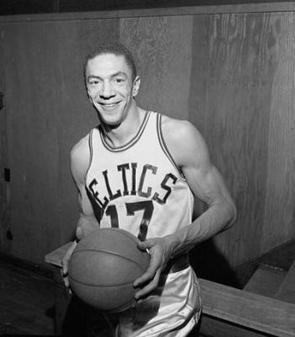
Donald Argee Barksdale (March 31, 1923 – March 8, 1993) was a basketball player. He was a pioneer as an African-American basketball player, becoming the first to be named NCAA All-American, the first to play on a US men’s Olympic basketball team, and the first to play in an NBA All-Star Game. He was inducted into the Naismith Memorial Basketball Hall of Fame. He played for the Baltimore Bullets and Boston Celtics. Born in Oakland, he attended nearby Berkeley High School, where the basketball coach cut him from the team for three straight years because he wanted no more than one African American player. He played at Marin Junior College before earning a scholarship to UCLA. In 1947 he became the first African American to be named consensus All-American. He was a Charter member of the Gamma Xi Chapter of Alpha Phi Alpha Fraternity at UCLA. He owned one of only two Black-owned record stores in Los Angeles during his time at UCLA. This had him interacting closely with performers like Etta James, Lou Rawls, and Nat King Cole. He became the first African-American to win an Olympic gold medal in basketball. He, who had been playing with the Amateur Athletic Union’s Oakland Bittners, was given an at-large berth from the independent bracket, but not without heavy lobbying by Fred Maggiora, a member of the Olympic Basketball Committee and a politician in Oakland. Maggiora told him that some committee members’ responses to the idea of having an African American Olympian were “Hell no, that will never happen.” But Maggiora wouldn’t let the committee bypass him. A documentary on Barksdale’s life, Bounce: The Don Barksdale Story, was released in 2007. He was inducted into the Bay Area Radio Hall of Fame in 2007. He was announced as a member of the 2012 induction class of the Naismith Memorial Basketball Hall of Fame. The character D’Angelo Barksdale from The Wire was named in tribute to him. #africanhistory365 #africanexcellence #alphaphialpha
0 notes
Text
List of my The Wire faves so far, categorically speaking:
Hella neat!: Omar Little, Shakima Greggs, Cedric Daniels, Lester Freamon, Shardene Innes, D’Angelo Barksdale
Bastard (affectionate): Russell “Stinger” Bell, Avon Barksdale
If a character’s not in this list, it means I either don’t like, don’t care for or don’t remember them.
1 note
·
View note
Text
all i’m saying is that kendall’s storyline is giving me strong d’angelo barksdale vibes
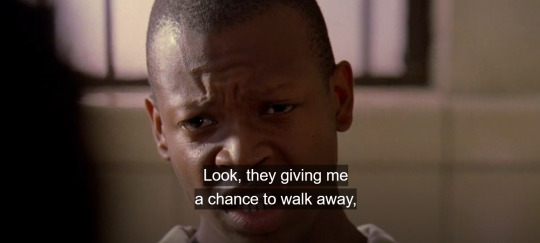
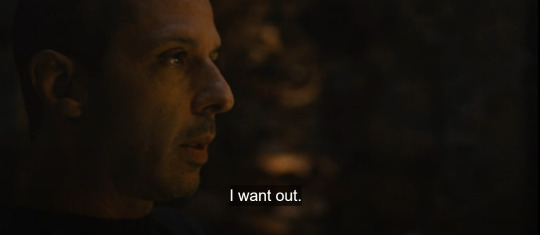
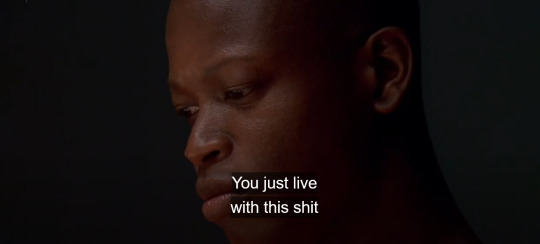
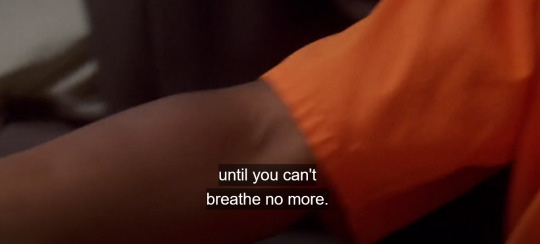
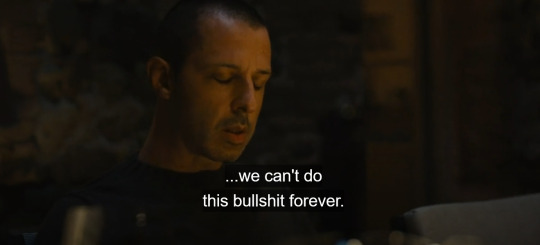

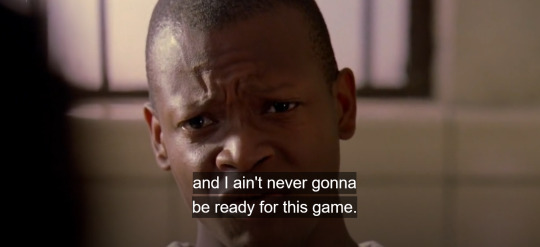
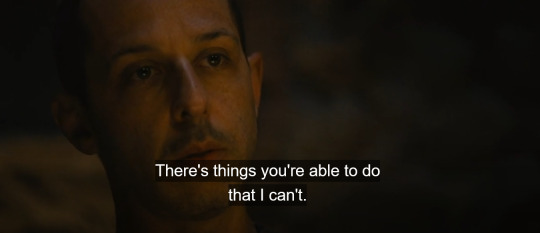
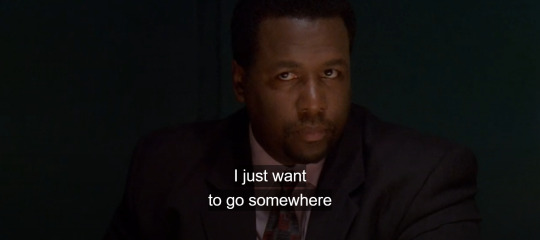
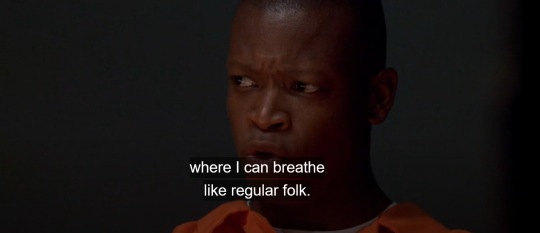
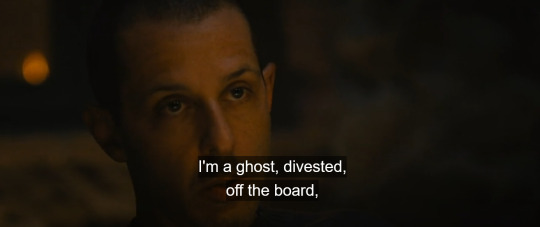
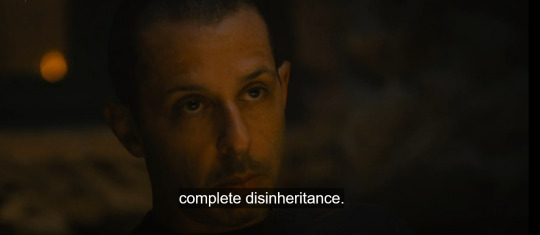
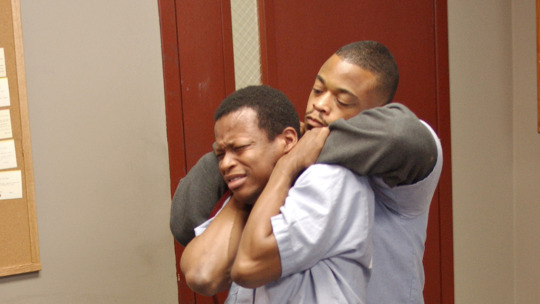
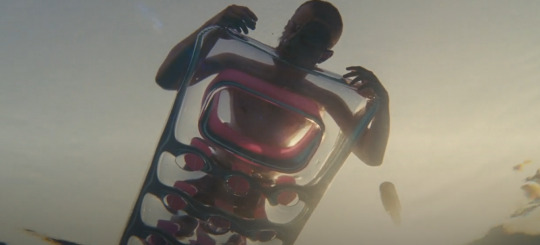
7 notes
·
View notes
Text
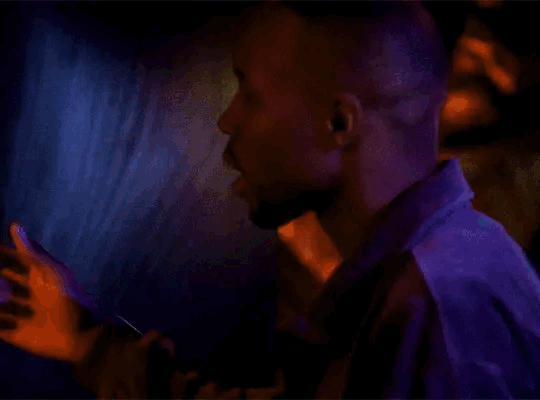
Bill Withers has one of the best song uses in a movie/show. Avon Barksdale's 1st appearance is set to "Use Me" as D'Angelo enters the club. Perfect song emotionally but also thematically. It's D's story. "You just keep on using me / until you use me up."
#the wire#yn.#avon barksdale#d’angelo barksdale#bill withers#music#☀️#its rly fascinating seeing the diff emotional tactics avon employs to try to get dlo to take his place likeee#here in this scene as a shadowy behind the scenes figure being cruel/having a certain level of murda expectations over dlo head#s2 when they locked up hes much more kinder & open to dlo cuz he know sum not rite#n also cuz avon himself is playing the long game to get outta prison early lolol#but avon could never actually hurt his lil nephew#stringer …. stringer’s cold cold heart took care a neph#im a teedy so maybe dats y avon - dlo drive me craz#n dlo was like what 23 in all this? growing up w ur uncle whos only like 13-14 yrs ur sr giving u v mixed v jarring messages#‘get ur mind rite nephew’ but its being the heir to my drug empire likeee#stringer lingers (ha!) all over this…
8 notes
·
View notes
Text
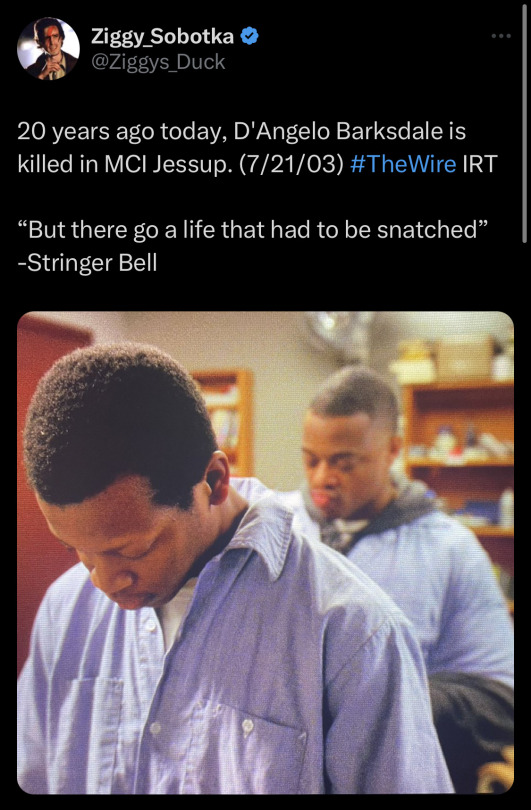
17 notes
·
View notes
Text
be glad I lack gif-making capabilities bc I’d be releasing my Kendall Roy/D’Angelo Barksdale parallels upon the world
#someone said this in the tag like 3 years ago and im saying it now#doomed golden boy nepo baby#the patriarch thinks you’re too sensitive#you cannot outrun your fate boy!!!
1 note
·
View note
Text
I decided to start another rewatch of The Wire in the first time in forever. And you know, while watching it I immediately thought of Succession. That’s probably mostly because Succession is fresh in my mind. The two shows are not exactly that similar tonally. Although. They are both nihilistic, dark and occasionally funny. And they do have narrative parallels. The first season of the Wire centres around a violent crime syndicate running Baltimore, with some focus on the dynamic between a powerful patriarch and his more sensitive nephew who works below him. I knew there was something about Kendall Roy that felt familiar to me, (beyond the obvious Shakespearean comparisons). D’Angelo Barksdale is a tragic figure in The Wire. He’s likely been written about to death, there’s so much to say. But something in Lawrence Gilliard Jr’s performance, the vulnerability of it, reminds me of the choices Jeremy Strong makes when he plays Kendall, also as a tragic figure. Like Kendall, D is someone whose very nature is at odds with the brutality required of him to play the game and maintain his family’s considerable power. Hell, brutality and ruthlessness are required in order for D to be part of his family and to be the man they want him to be. The flavour of brutality required of them varies slightly between The Wire and Succession, but morally I’d argue it’s not as much as you’d think. Both D and Ken are complicit in a system that profoundly hurts people for financial gain, and the corruption in the systems they’re part of is a feature and not a bug. Both of them have gotten away with murder, but at least D was working when he committed his and not just fucking around. Wasn’t less of a stupid murder, though.
The Roys’ syndicate is probably worse for humanity in the long run. I’d also argue that D is actually a better person than Kendall, all things considered. It’s all about context, and within the context of The Wire his decision to not play the game is suicidal (and I know there are Kendall parallels in that but they play out differently). How much of that can be down to D’s moral character is anyone’s guess, because when he’s dead there’s no more story. Like D, Kendall was also pushed to take the fall for a corrupt, violent syndicate not entirely of his making. But unlike D, he doesn’t go to prison in the end. And the show emphasises how little Ken’s choice to go against his father has to do with his moral compass. Kendall also has white privilege and a bunch of other factors going for him, which make his power, position and choices a different kind of conversation. Really, the Roys are beyond the law in a way that the Barksdales could never truly achieve. Because the Roys are legit. They get away with everything in plain sight and people in considerable positions of power fawn over them. Stringer Bell would utterly salivate over their position.
Anyway The Wire is still a great twisted morality tale. The end.
#the wire#I’m sure I’ll think of more when I rewatch the rest of season 1#succession#tv analysis wank#spoilers to the wire I guess#but this shit’s been around since 2005#so.that’s on you if you haven’t seen it
20 notes
·
View notes
Text
MBTI Typing Index: Fictional Characters — ISTP ESTP ISFP ESFP
Fictional characters: NF, NT, SJ, SP. Real people: index.
—
ISTP
Better Call Saul: Mike Ehrmantraut, Nacho/Ignacio Varga
Breaking Bad: Mike Ehrmantraut
Brokeback Mountain: Ennis Del Mar
Drive: Driver
ER: Abby Lockhart
Friday Night Lights: Tim Riggins
Game Of Thrones: Sandor Clegane, Osha
(The) Girl with the Dragon Tattoo: Lisbeth Salander
(The) Good Wife: Kalinda Sharma
(The) Hunger Games: Katniss Everdeen
Jessica Jones: Jessica Jones
(The) Last Kingdom: Brida
Malcolm in the Middle: Reese
Mindhunter: Debbie Mitford
Money Heist (La Casa de Papel): Marseille, Bogota
Nana: Nana Osaki
(The) OC: Ryan Atwood
Ozark: Ruth Langmore
Skam: Isak
Skyfall: James Bond
Taxi Driver: Travis Bickle
(The) Tunnel: Elise Wasserman
(The) Wire: Kima Greggs, Michael Lee
X-Men: Wolverine
Y: The Last Man: Agent 355
—
ESTP
(The) Bear: Richie Jerimovich, Michael Berzatto
Better Call Saul: Jimmy McGill
Black Swan: Thomas Leroy
Breaking Bad: Saul Goodman
(The) Crown: Philip
Dallas Buyers Club: Ron Woodroof
Downton Abbey: Jimmy Kent
ER: Gregory Pratt
Fight Club: Tyler Durden
For All Mankind: Molly Cobb, Tracy Stevens
Friday Night Lights: Smash
Game Of Thrones: Bronn, Yara Greyjoy
Gilmore Girls: Logan Huntzberger
Gone with the Wind: Rhett Butler
(The) Good Wife: Will Gardner
Industry: Harper Stern
(The) Last Kingdom: Uhtred, Finan, Leofric
Malcolm in the Middle: Francis
Marvel Universe: Star Lord
Men In Black: Jay
(Les) Misérables: Thénardier
Money Heist (La Casa de Papel): Berlin
(The) Mummy: Rick O’Connell
(The) OA: Steve Winchell
One Flew Over The Cuckoo’s Nest: McMurphy
Queer As Folk: Stuart Jones
Rome: Mark Antony
Rush: James Hunt
Scarface: Tony Montana
Sister Act: Deloris Van Cartier
Sex and the City: Samantha Jones
Skam: Chris
Skins: Cook, Liv
(The) Sopranos: Tony Soprano
Sound of Metal: Ruben
Star Wars: Han Solo, Poe Dameron
(The) Wire: Jimmy McNulty, Avon Barksdale
(The) Wolf Of Wall Street: Jordan Belfort
—
ISFP
(The) Bear: Carmy Berzatto
Blue Is The Warmest Color: Adèle
Boyhood: Mason
(The) Bridge (Bron/Broen): Henrik Sabroe
(The) Crown: Diana Spencer
(The) Curious Case of Benjamin Button: Benjamin Button
Downton Abbey: Daisy Mason
ER: Luka Kovač
Friday Night Lights: Matt Saracen
Game Of Thrones: Jon Snow, Gilly
Harry Potter: Harry Potter
Jessica Jones: Malcolm Ducasse
Money Heist (La Casa de Papel): Helsinki, Moscow
(The) Last Kingdom: Osferth
(The) OC: Marissa Cooper
Skam: Yousef
Skins: Freddie
Star Wars: Anakin Skywalker
(The) Wire: D’Angelo Barksdale
—
ESFP
Bloodline: Danny Rayburn
Breaking Bad: Jesse Pinkman
(The) Bridge (Bron/Broen): Martin Rohde
Bridget Jones’s Diary: Bridget Jones
(The) Crown: Margaret
(The) Curious Case of Benjamin Button: Daisy
Downton Abbey: Mrs. Patmore, Rose MacClare
Dragon Ball: Goku
For All Mankind: Gordo Stevens
Friday Night Lights: Tyra Collette
Friends: Joey Tribbiani
Game of Thrones: Arya Stark, Ygritte
(The) Good Wife: Veronica Loy
Harry Potter: Ron Weasley
Hope Gap: Grace
(The) Hour: Verda Rowley
Malcolm in the Middle: Hal
Masters of Sex: Betty
Money Heist (La Casa de Papel): Tokyo, Denver
My Mad Fat Diary: Rae
Ozark: Ben Davis
Parenthood: Crosby Braverman
Rome: Titus Pullo
(The) Secret History: Bunny Corcoran
Se7en: Mills
Skam: Eva, Eskild
(The) Sopranos: A.J. Soprano
Squid Game (Ojing-eo Geim): Seong Gi-hun
Titanic: Molly Brown
(La) Vie En Rose: Edith Piaf
Winning Time: Earvin “Magic” Johnson
(The) Wire: Namond Brice
—
Fictional characters: NF, NT, SJ, SP. Real people: index.
15 notes
·
View notes
Text
Bubs is one of the most admirable characters in The Wire because he takes responsibility for himself. The diffuse nature of responsibility is a theme throughout the show; Stringer ordered D’Angelo’s death, but is he the only one to blame? Beyond the Barksdale family, there’s the prison itself, holding a bunch of men in a place where they’re powerless and can’t escape. McNulty needs to turn dealers and uses his relationship with Bodie to get information, but this indirectly leads to Bodie’s death. Does that mean it’s McNulty’s fault? Not necessarily, but he’s involved. No death on the show is a simple murder because of the rich tapestry of context weaved by the narrative: history, culture, conflicting interests, institutions.
Bubs is one of the least powerful, and thus least harmful, characters in the show. But the story doesn’t cast him as just a helpless victim, easily liked because of his lack of flaws. I spent two years of my life as a serious alcoholic, so I know addiction can spiral a person out of control. It makes you irresponsible, unable to take care of yourself, unable to think clearly, likely to prioritize your own addiction above all else. All of that was there in Bubs’s character, even as he was one of the most likable characters on the show.
In season 4, he begins to mentor the street kid Sherrod. Bubs tries to steer the kid back into a better life, get him an education so he doesn’t become a homeless addict like himself. However, he doesn’t have the resources to really do anything for the kid. That’s a part of his shame and failure. He also gets attached to the companionship Sherrod brings him, which conflicts with his desire to get the boy off the street.
Although Bubs is widely liked, he begins to be assaulted regularly by a robber. No one ever intervenes to help him, not even Sherrod. Bubs later tells the kid that he would have done the same thing, just stood by if Sherrod was attacked, because that’s the way the street is. But later, we see this isn’t true; when Sherrod is assaulted by the robber, Bubs shields him with his own body.
Bubs has long been a police informant and thus has connections. He turns to the cops for help. First he’s robbed by one of the most sociopathic ones, who cites him for selling wares without a permit. Then he asks Kima and McNulty for help. Although they like him, they’ve never taken him all that seriously. In a dynamic often seen in the real world, the outcast, deemed unworthy by society, is also treated as lesser even by friends. They shrug Bubs off onto Herc. Herc was never a caring individual and is more concerned with his stupid camera than Bubs. (Ultimately Herc is unsuccessful with his mission and gets to go on to have a lucrative career as a scumbag lawyer, another example of the failure of justice.)
After Bubs is completely screwed over by the system, he decides to take matters into his own hands and kill the robber using poison, fake cocaine in a little vial. Of course, he doesn’t run into the robber, and instead, his young friend digs into his pockets that night. Sherrod dies, leaving Bubs to wake up to the body.
What follows is the most true expression of remorse and self-condemnation on the show. Bubs turns himself into the police, absolutely devastated and withdrawing from heroin. He attempts suicide in the station. He recalls how he’d tried to show Sherrod the ropes, “like I wasn’t who I am—like I haven’t been a dope-fiend all my life.” He begs to be put away. His words “I killed that child” will haunt me for years to come.
Did Bubs kill Sherrod? As much as the robber, McNulty, Kima, Herc, and Sherrod himself did. As much as the environment of homelessness and addiction did. But those wider questions of responsibility aren’t what Bubs is concerned with. He takes it on himself. He feels it deeply, the fact that Sherrod had no one to care for him, no one to care if he died.
Responsibility isn’t about fairness. There’s no way to parse out responsibility and equally allot it to all parties. I find responsibility to be very important, but it can only come from within: from an individual taking up the mantle. Bubs is the character on The Wire who did that most fully, who didn’t try to shake off responsibility. He changed his life, got clean, and worked to make a positive contribution to his community. With responsibility comes respect.
0 notes